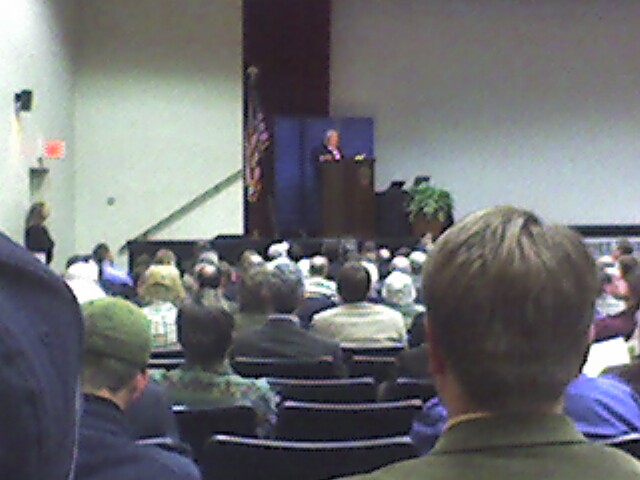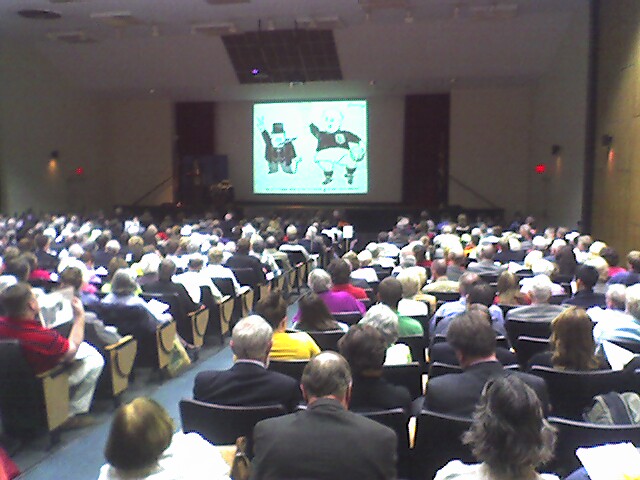Tom at the Baker Center Churchill Conference
 Wednesday, March 29, 2006 at 5:19AM
Wednesday, March 29, 2006 at 5:19AM All the opening statements are celebrating the "special relationship" between the US and the UK.
My talk is titled: "The Special Relationship and The Pentagon's New Map." My somewhat shocking subtitle, to be revealed only on stage, is "Special Relationship? Yes, just not with the UK."
Guess where I'm going with that?

Sen. Howard Baker opening the conference.

From the back of the auditorium, speaker before me.

Unfortunately, as close as I got to HK on stage after I signed books and gave a TV interview following my talk, which was well-received.
HK's talk about historical UK-US rels in 20th mirrored my own, which was pretty exciting.
Sorry for blur. Best I could do after he started talking. Naturally, it was SRO.
My favorite line: "We live in a period in which most of what we know from history is inapplicable or applicable in limited ways."
Then he says, Asia today is like 19th C. Europe and the Middle East is like the 17th C. Then there's globalization which both integrates economically and fragments politically. And somehow we need to synthesize this all in a way the public can understand.
Hmm. HAK was in the first-row for my speech. I would be interested in his feedback, but fear I won't get near him in the post-talk crush. Plus I need to bug out for the airport.
HI awaits, as does my son.
Still, very cool to see him speak in person.











Reader Comments (9)
Oh my gosh, I hope you don't say it is China. Not having Cold War II is one thing, but until China looks more like us in terms of political freedom, something which is decades away, that would really be pushing it.
I hope it's India, since I think that is where the next English-speaking special relationship should be USA + India, for reasons too numerous to mention in this comment.
The Anglo-American Special Relationship had foundations in (1) common strategic interest, (2) deeply-linked economies (dense connectivity in your parlance) AND (3) common culture -- language, law, business culture. China is not really close on 1, fairly close on 2 and not at all close on 3. India is close on 1, not close but getting closer on 2, and quite close on 3. Overall India is a much better candidate for a 21st Century Special Relationship with the USA.
Having been reading your blog regularily from the day when you your started it, I would not be surprised if you advocated a special relationship with China.
Would that be the case, I would be tempted to ask at which stage was Sir Winston advocate a proponent of appeasement?
Tom totally rocked! I consider myself fortunate to have been in the audience.
Opps!
I meant:
"Having been reading your blog regularily from the day when you your started it, I would not be surprised if you advocated a special relationship with China.
Would that be the case, I would be tempted to ask at which stage was Sir Winston a proponent of appeasement?"
Posted by: Pascal Venier | March 29, 2006 04:58 PM
RE Churchill's appeasement: Maybe during the Lend-Lease negotiations? Or maybe when DDE was picked over Monty for SAC?
Refer to the Esquire article on China. These political fredoms you ask of China are warranted and will come. Probably, just as soon as the middle class has the money to make it happen. And judging by the number of Walmart stores opening up around here, I'd say we're getting closer.
Rock on.
Any chance we are going to get another video from one of your more recent talks or briefs?
Why not stipulate video for all of your public appearances, which you could then make available on your site.
You are the strategist du jour, there have to be some perks along with that title. One of those perks should be requiring video of all of your public appearances. And even if you don't make the video available on your site, you could require that the video be provided on the website of where you are appearing, or speaking. Which you would then link to on your own site.
Dr. Barnett, I enjoyed your talk at the Baker Conference. Your passion is evident, and your insights have reoriented my perspective.
In the hallway at the conference, I asked a question in regards to the doctrine of pre-emption.
As I've thought more about your response, I have tried to clarify my own thoughts. In particular, I understand your comments that pre-emption is indeed an important strategy.
To hone my original question, I would now ask your view on "unilateral" pre-emption. Do you think that pre-emption requires multi-lateral support?
If so, to what degree? By what mechanism (UN)?
If not, is there a cost to uni-lateral pre-emption?
This question evokes an internal struggle within my own thoughts. My hope is that your laser-beam focus can carve out the pertinent grey matter or, at least, illuminate the dark matter.
David: i can answer that question. did Tom talk about his A-Z process for politically bankrupt states? short version: the UN indicts. the G20 functions as an executive that decides to preempt, puts money into a reconstruction fund, and commits their own troops to the SysAdmin phase. then the US Leviathan goes in.
that's brief, but Tom wrote a lot about it in Blueprint for Action. also there's got to be a lot here on the weblog. I'll search later if I get a chance.